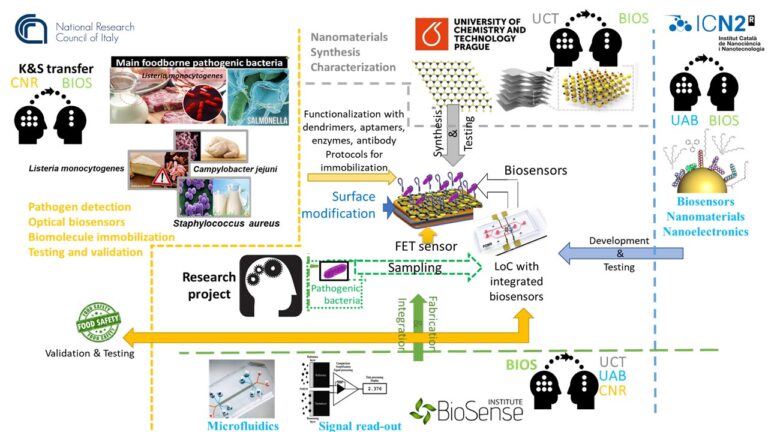Dr. Vasa Radonic
Project coordinator
Location:
BioSense Institute, University of Novi Sad
Dr. Zorana Đinđića 1, 21000 Novi Sad, Serbia
Dr. Vasa Radonic
Project coordinator
Location:
BioSense Institute, University of Novi Sad
Dr. Zorana Đinđića 1, 21000 Novi Sad, Serbia
The Know4Nano project will bring together BioSens Institute and three leading EU research institutions, whose complementary expertise in the field of BnT will be leveraged to develop cutting-edge biosensing platforms for practical applications along the farm-to-fork food chain. By establishing a knowledge transfer platform based on carefully designed mobilities, trainings and novel approaches in mutual collaboration, the project will improve excellence capacities of BIOS, while enhancing strategic networking activities between all partners.
Know4Nano will enable researchers from BIOS to acquire essential expertise, competencies, and skills in the field of nanomaterials, biosensors, microfluidics, and food safety, increasing their individual research portfolio, and consequently boosting institutional research reputation. Furthermore, the strategically designed collaboration will enhance BIOS research management capacities and administrative skills, unlock existing research potential and applicability of research results.
The knowledge transfer will be of particular importance during this project, which will enable long-term adoption of scientific and technological excellence from the leading European partners’ institutions:

O1 Extending the scientific and technological ground at BIOS in BioNanoTechnology (BnT)
The specific field of research currently conducted at BIOS, the coordinating institution, focuses on addressing sensing challenges in the environment and agriculture, particularly through the development of different sensors for the detection of specific pollutants, nutrients, plants and soil characteristics. The Know4Nano project aims to leverage the current research infrastructure and sensing expertise by establishing expertise in BnT for conducting future R&I on topics of utmost importance for food safety and traceability including development on nano-biosensors.
O2 Facilitating the transfer K&S and implementation of new research activities
Know4Nano will facilitate the transfer of the advanced K&S in the design and synthesis of nanomaterials, biosensors, functionalization protocols, characterization and measurements, equipment usage and necessary upgrades. The activities are thoughtfully planned to improve strategic networking and strengthen the ties between the partner institutions, as well as to facilitate the transfer of K&S, and devise the agenda for the implementation of future activities, which will also establish productive collaboration channels with all partners and interested parties. Besides, by adopting various specific expertise, Know4Nano will significantly improve the portfolio of BIOS staff in the field of BnT and establish the expertise for further R&I challenges.
O3 Development of novel biosensing devices for multiple pathogen detections through R&I activities
The complementary expertise of the team members will be combined with the purpose of developing highly sensitive portable biosensors for rapid quantitative detection of the most common foodborne pathogenic bacteria. The R&I activities will be focused on developing, testing and validation of low-cost sensing device comprised of an area of a field-effect transistor (FET)-based biosensors integrated inside the MF disposable cartridges for in-field PoC diagnostic of multiple pathogens.
Certain novelties rely on the following:
1) Synthesis of various types of nanomaterials with superior charge transfer and high specific surface properties as A) metal oxide semiconductor (MOS) nanostructures, and B) 2D nanostructures (transition metal dichalcogenides (TMDs) and MXenes) and their composites.
2) Designing complex material heterostructures to explore their synergistic effects in devising innovative highly sensitive, selective and reliable FET-based biosensors.
3) Design and fabrication of low-cost biosensors for PoC testing,
4) Developing novel protocols for biomolecules immobilization (enzymes, aptamers, and antibodies) on new nanomaterials;
5) Development of the procedures for biosensors testing and validation;
6) Integration of the biosensors into MF platform for multiple pathogens detection simultaneously. The results of the project will permit a TRL5 for MF with integrated biosensors. Collaborative research will enhance K&S, addressing gaps in BIOS related to 2D materials, microfluidics, and biosensor development.
O4 Career advancement of BIOS research staff
Know4Nano will provide new training opportunities for young and experienced scientists, management and administration staff to improve their existing and acquire new knowledge and experience. Researchers will have the opportunity to acquire new knowledge and practical experience through various project activities, including workshops, training schools, expert lectures, and online training. They will further enhance their expertise during planned visits to partner institutions, where they will receive hands-on training with various lab equipment and collaborate on high-level multidisciplinary research. Through individual advancement of research staff, BIOS will improve excellence capacity, raise reputation and attractiveness, but also will increase research management capacities to a large degree.
O5 Enhance the research management and administrative (M&A) capacities
The Know4Nano aims to enhance management capacities and staff administrative skills by strengthening and restructuring of the Center for Innovation and Business Development (CIBD) capacities. This will be achievable through the exchange of best practices and building upon the experience of partner institutions in the project. The goal is to further raise the profile of CIBD staff, researchers and BIOS institutional capacities and devise the agenda for establishing the Technology Transfer office (TTO). This will maximize the engagement of Project management office (PMO) in research, support and develop administrative capacities to capture innovation, enforce patenting, and commercialization of inventions efficiently and effectively.

This project is funded by the European Union under Horizon Europe under Grant Agreement No. 101159710